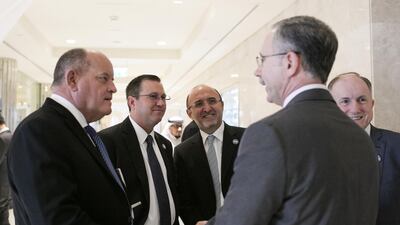ABU DHABI // Corporate partners involved in The National Space Programme hope to use the initiative to develop the next generation of talent to drive space exploration into the future.
For the programme, The National has teamed up with 12 partners – government agencies and corporate entities.
Ahmed Al Shamsi, chief technology officer at Thuraya, the Dubai mobile satellite communications company, said being a partner provided benefits to his organisation as well as the local aerospace industry.
“I believe this project is important to bring awareness and develop talent for the space industry in the UAE and also bring technological benefits from international partners,” he said.
“As a private company, we believe that when technology and awareness become available in the UAE, we will benefit a lot from that, either from a human point of view, a technology point of view, or from a design and manufacturing perspective.
“We are looking at this from a long-term point of view, rather than the short term.”
Peter McGrath, director of global sales and marketing at Boeing – one of the competition’s key partners along with the UAE Space Agency – said participating was part of his organisation’s outreach efforts, which include a partnership with Khalifa University.
“We take a lot of initiatives focused around Stem and workforce development in the US and elsewhere,” he said.
“We saw this as an opportunity to leverage not only our experience in doing workforce development in the United States, but also on how we can broaden our relationship with the UAE and see where there are opportunities to grow.”
Additionally, Mr McGrath said collaborating with international partners could produce tangible results, like the International Space Station, which he said involved 15 nations.
“It’s human resources but it’s also diversity of thought,” he said. “People come to you from different aspects, whether cultural or educational, and they bring in different opinions and thoughts that actually help you drive and shape your business.
“We have learnt that no one country can afford or have the skill set to do it alone,” he said. “It’s really when you leverage the skill sets across several countries that you can really accomplish big things.”
Additional partners involved in The National Space Programme include the Abu Dhabi Education Council, Yahsat, Khalifa University, Mohammed bin Rashid Space Centre, Ministry of Education, the Knowledge and Human Development Authority, Twitter, Abu Dhabi Music and Arts Foundation, and the Emirates Foundation.
esamoglou@thenational.ae

